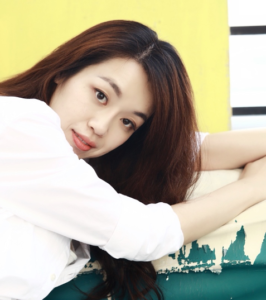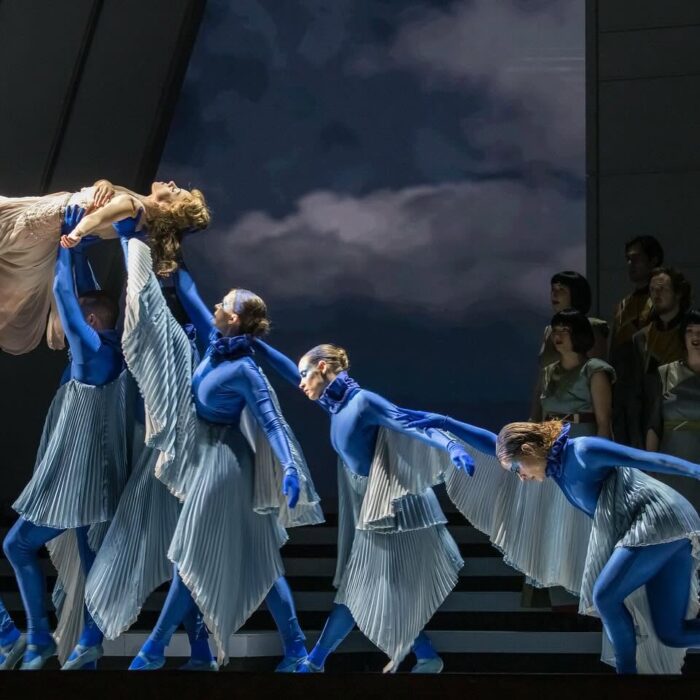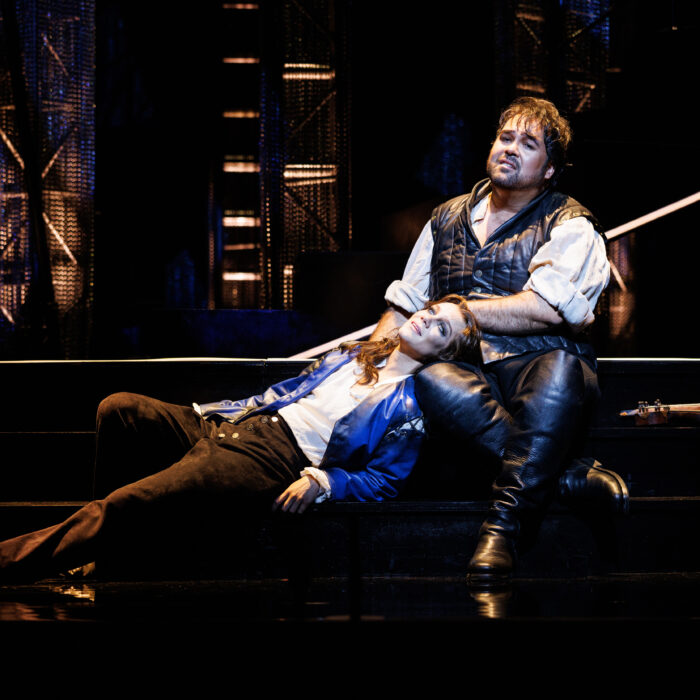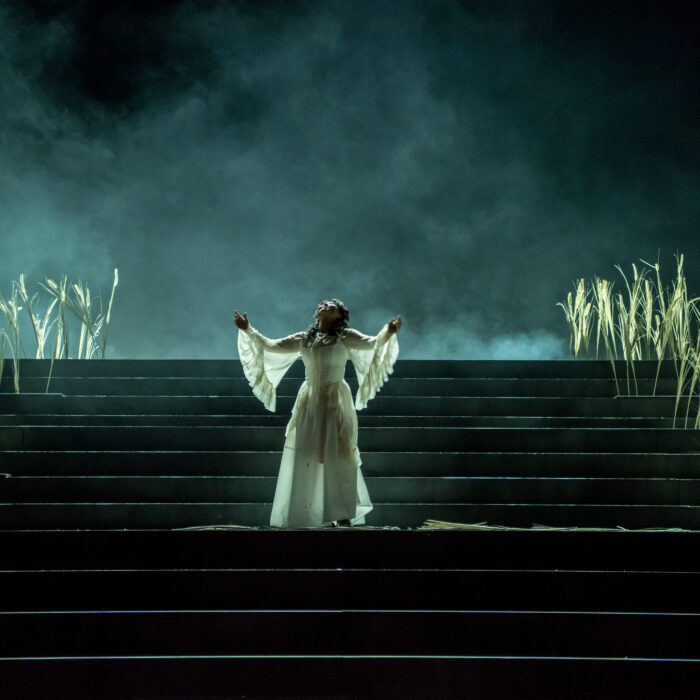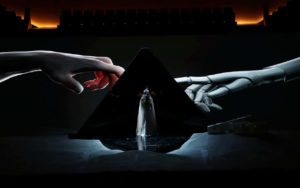
Jaguar Shanghai Symphony Orchestra Hall 2021 Review: AI Variation
By Dr. Dong YikunHao Weiya’s one-act “AI Variation” is the operatic embodiment of a single idea: that the greatest danger posed by the rapid advance of technology is people who believe they control it.
The work, by composer Hao Weiya and librettist Wang Yuanfei, tells the story of three people over the course of seven life-changing days, sometime in the not-so distant future. It deals with big themes, such as mortality and immortality, rationality and madness. The artist Situ Rui—played by Zhou Zhengzhong—is trapped in both a creative rut and facing his impending death. Li Yao—played by Li Jingjing—is a scientist who uses Artificial Intelligence technology to save him. Chu Qiao—played by Dong Fang—is Situ Rui’s lover, who resists the idea that technology is a panacea for all ills, and tries to stop Situ Rui from being “updated.” Her efforts are in vain. The new Situ Rui, without memories and ideas of a man, has been transformed into a humanoid machine: a machine which gains immortality by gaining time and self-actualization by gaining rationality.
The contrast between Situ Rui’s dying “feeling part” and his deathless “machine part” grips the audience to the end of the show, as these three characters desperately try to figure out what makes us essentially human. Chu Qiao insists that death, by forcing us to understand loss and love, gives human beings knowledge and inspiration. Li Yao and Situ Rui end their performances with no clearer grasp of their inherent humanity—or inhumanity—than they had when the opera began. They are still unsure whether the ‘machine part’ of a human is what an idealized man quests for. Will science change what it means to be alive? If a machine possesses all the thoughts and ideas of a man, would it then become the man? The opera leaves these questions open-ended: questions that the audience will take home with themselves.
What is equally alluring about this work are the questions of what is natural and what is human. Having heard the news that Situ Rui has been updated, transformed into a humanoid machine, Chu Qiao cannot bear to face the reality she is now in. She believes that human beings are alive and distinguished from machines by love and affection as well as by warmth and sensual urges. It is mortality, she insists, that defines love. She therefore doubts whether the Machine-Rui can still remember and understand the love once shared between them. In contrast, Li Yao says humanity is the reason for so much of the world’s troubles: humans create the problems they suffer under across the planet, as well as being responsible for the creative deadlock they are constrained by. It is the rule of reason that compels beings to search for transcendence in faith, art and relationships.
But is it humane if we are preoccupied with endowing machines with human characteristics? What if we no longer have time to think and wonder ourselves, because the rule of reason has filled our day with an obsession with technological advancement?
“AI Variation” is destined to join the Chinese operatic canon for its’ success. Its’ score, which is an innovative blend of contemporary opera and invented natural tunes, raises difficult questions about human spirits in the coming era of Artificial Intelligence. Under the skillful direction of Zhang Jiemin, the imaginative, flowing music indicates that any words would be inadequate to express many of the composer’s insights into the truths of life.
A variety of innovative acoustic atmospheres is a departure from operatic conventions. It is Hao Weiya’s attempt to portray signs of ambiguity and complexity when defining what is “essentially human.” Crystal wine glasses half-filled with water mimic natural light, inviting audiences to see an alternative side of something common. Harmonies are used to mimic natural surroundings, which bring to mind questions such as; is man separate from or a part of nature; and how does nature reflect human emotions? The disharmonic intensity of certain chords produced by the orchestra call to mind the experience of spiritual awakening.
There are allusions to Richard Strauss’s “Death and Transfiguration” from start to finish, which is a signature ingredient of Hao Weiya’s, added to emphasize the importance of solitude and contemplation in transcending the confusing and desperate existence that people face in a computer culture.
Most delightful of all, the music is scored to make each phrase of the performers perfectly audible. The pitch and tempo changes throughout the recitative parts, enabling the singers, like actors, to deliver their lines according to the rhythms of natural speech, and even allowing for moments of seemingly instantaneous inspiration.
The baritone Zhou Zhengzhong’s performance as Situ Rui proves to be so pitch-perfect, lifelike and well regulated in its intensity that the audience probably fail to perceive the momentary alienation effects of the orchestration are employed to criticize the presence of hypocrisy, unjust and biased behaviors in his aria “Who are you? Who am I?” This narrative technique of the orchestra, following the dialogue so closely and highlighting moments of conversation, is again used to draw focus to the interaction between human and machine in “There was a knock on the door,” when the meeting of man and machine does not proceed as expected. The deft economy of Zhou Zhengzhong’s dramatic gestures makes his performance of a humanoid machine riveting.
Chu Qiao, excellently characterized by mezzo-soprano Dong Fang, is a warm and sympathetic presence, imbuing each line with dramatic characterization. Soprano Li Jingjing is a beating heart onstage who juxtaposes reason and love in the aria ‘The last man on Earth sat alone in a room.’
The set always serves the drama and meaning of story. Once can only imagine the pressure which was on Yang Jingze, the director and set designer, to create a visual environment that could adequately reflect such a philosophically rich piece.
At a time when when China is seeing a wave of nationalistic music, theatre and dance, ventures such as “AI Variation” showcase the commitment of Chinese artists to balancing patriotic works with western music and other art forms, engaging creatively with kaleidoscopic aspects of contemporary global culture. “AI Variation” offers a way forward in terms of building cultural support for opera in China, which has begun to witness a growing group of younger opera-goers, as well as initiating philosophical conversations about what opera is and what it should be. Ultimately this is an opera about how we live under pressure from the computer. Control versus freedom, the mental versus the mechanical, uniqueness versus mass manufactured product. Dualities pervade this piece, exemplified by the composition’s acoustic music.
“The last man on Earth sat alone in a room. There was a knock on the door.” The allusion to Fredric Brown’s short story at the ending of “AI Variation” is intended by Hao Weiya and his collaborators to serve as a reminder: that our belief is often strongest when, rationally, it should be at its weakest. This is the very essence of hope. And only in hope is every explicit duality implicitly unified.
